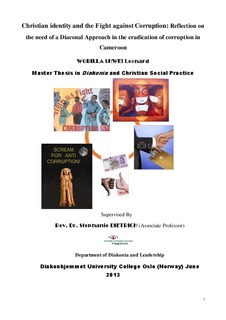| dc.description.abstract | Corruption creates an unjust society that no longer guarantees equal rights and opportunities for its citizens. It creates a climate of suspicion and distrust between individuals; it condemns them to live in fear and insecurity.
This master thesis has explored, discussed and analyzed the need for the church in Cameroon to address corruption. The majority of Cameroonians suffer directly or indirectly from corruption. They live in poverty and the poverty level is a result of political economic and moral corruption. The church as a central civil society institution stands in a strategic position to address corruption, injustices, and social ills since it is able to work directly with people at the lowest and highest level. This thesis builds a case that such work is better done in practice rather than in merely in words.
The thesis looks specifically at the efforts of the Roman Catholic Church in fighting corruption at the economic political and moral levels by discussing and analyzing the pastoral letters of the Catholic Bishops of Cameroon concerning this chronic phenomenon in the country. It notes that socio-economic injustice is a global issue requiring attention from international institutions. Foreign bodies contribute to the fast growing rate of corruption in Cameroon.
An analysis of the theological (biblical) approach to the issue is provided. When it comes to tackling social issues there is need for strategies to bring the Gospel to all without distinction of race, religion or color. Diakonia represents the best tool amongst others to be used in the fight against these issues. An ecumenical voice is suggested as the best road to the ultimate destruction of the roots of this ill. Even though the Church acknowledges in general its needs to be involved in combatting these social ills, disagreements crop up concerning its involvement especially when connected to political issues. One example of this is the bishops’ suggestion that police supervise elections in Cameroon as discussed in this thesis. The Church needs to venture above reactive strategies and act more proactively in order to identify and eradicate root causes of social ills as a whole and the alarming corruption in particular.
Central to this thesis is making a case that for a successful transmission from words to action, the church in Cameroon needs to embrace Diakonia and make use of its prophetic role to eradicate these ills. Added attention needs to be paid to the marginalized, poor, abandoned, disabled etc. As an opening and remedy for the church in Cameroon, this master thesis suggests a revised version of an ecumenical engagement at local, provincial and national levels to eradicate corruption. Implementing teachings in schools against this issues will do a great deal. There is therefore a need for transformation, empowerment and equality in addressing issues. | no_NO |
